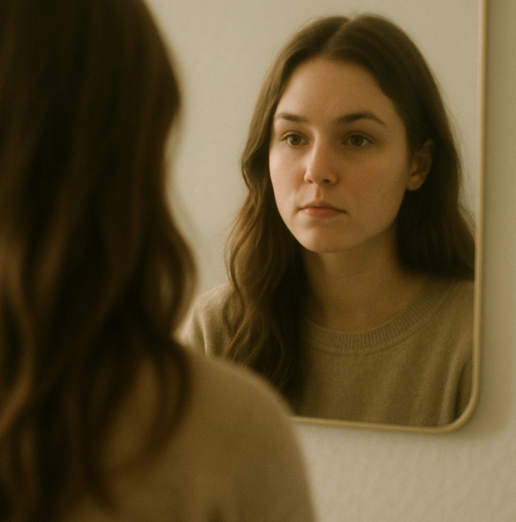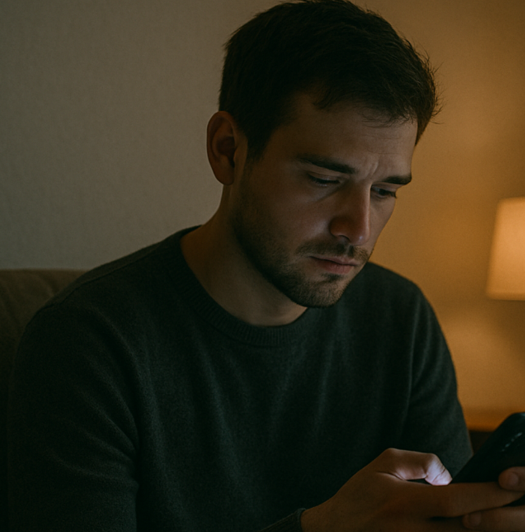Understanding Body Dysmorphia (BDD) and Finding Support

In our image-saturated world, where social media often presents a curated, 'perfect' version of reality, it's easy to dismiss concerns about one's appearance as mere vanity or a normal part of self-consciousness.
We all have days when we feel a bit down about how we look.
However, for millions of Australians, a persistent, intense, and often overwhelming preoccupation with perceived flaws can escalate into a debilitating mental health condition known as Body Dysmorphic Disorder (BDD).
It's a serious health problem that can profoundly impact every aspect of a person's life, from their daily routines to their deepest relationships.
What Exactly is Body Dysmorphic Disorder (BDD)?
BDD is a medical condition characterised by a preoccupation with one or more perceived defects or flaws in physical appearance that are either unnoticeable or appear slight to others. The distress caused by these perceived flaws is significant and can lead to repetitive behaviours or mental acts in response to the appearance concerns.
This intense focus isn't just a choice; it's a deeply ingrained pattern of thought and behaviour. Diagnosis is typically made based on specific criteria outlined in the Diagnostic and Statistical Manual of Mental Disorders, a key resource for mental health professionals.

It's crucial to understand that BDD is far more than just dissatisfaction with one's looks or low self-esteem. It's a distinct disorder with specific characteristics, often sharing features with obsessive-compulsive disorder (OCD), as it involves intrusive thoughts and compulsive actions:
- Intense Preoccupation: Individuals with BDD spend an excessive amount of time (often hours a day, consuming much of their waking thoughts) thinking about their perceived flaws. These thoughts are intrusive, unwanted, and very difficult to control, and feel almost impossible to shake off.
- The "flaw" can be anything – a specific body part (e.g., nose, skin, hair, teeth), a general body shape, or even something vague like skin texture or asymmetry. This preoccupation can be so intense that it's hard to focus on anything else.
- Repetitive Behaviours: In response to their preoccupations, individuals engage in compulsive and time-consuming behaviours aimed at checking, fixing, hiding, or seeking reassurance about their appearance. These rituals can consume a significant portion of their day and might include:
- Excessive mirror checking (or, conversely, extreme mirror avoidance).
- Compulsive grooming (e.g., hair pulling, skin picking, excessive makeup application, prolonged showering).
- Seeking constant reassurance about their appearance from others, often without ever feeling truly reassured.
- Comparing their appearance to others, either in person or on social media.
- Excessive exercising or restrictive dieting, often leading to weight loss or unhealthy body image.
- Seeking cosmetic surgery or dermatological procedures (which rarely alleviate the distress, as the underlying perception remains).
- Significant Distress and Impairment: The preoccupation and repetitive behaviours cause severe emotional distress, intense anxiety, profound shame, and often clinical depression. This distress significantly impairs daily functioning, making it incredibly difficult to work, study, maintain relationships, or even leave the house to engage in social activities. The internal suffering is immense.
- Social Isolation: Due to intense shame, fear of judgment, or the belief that others are constantly scrutinising their perceived flaws, individuals with BDD often withdraw from social situations, leading to profound loneliness and isolation. They might avoid school, work, or family gatherings, missing out on life experiences.
- Lack of Insight: Often, individuals with BDD have poor or absent insight into the true nature of their condition. They truly think their flaw is serious and obvious to everyone. This is true even when friends, family, or experts do not notice it or see it as minor. This confusion can make it difficult for them to realise that their pain is due to a mental health issue, not a physical one.

The Profound Impact of BDD
The toll that BDD takes on an individual's life cannot be overstated. Beyond the daily anguish and the constant battle with their own mind, it can lead to a long-term impact that affects their entire future:
- Severe Depression and Anxiety: The constant worry, self-criticism, and social isolation are fertile ground for developing major depressive disorder and various anxiety disorders, such as social anxiety or generalised anxiety. Individuals may experience common symptoms of depression, like persistent sadness, loss of interest, fatigue, and changes in appetite or sleep.
- Suicidal Ideation and Attempts: Tragically, BDD is associated with a high risk of suicidal thoughts and behaviours. The intense distress, hopelessness, and feeling trapped by their thoughts can lead to desperate measures, underscoring the critical severity of the condition.
- Substance Abuse: To cope with the overwhelming anxiety, shame, and distress, some individuals may turn to alcohol or drugs as a way to self-medicate, leading to further complications and addiction.
- Relationship Difficulties: The preoccupation and compulsive behaviours can strain relationships with partners, family members, and friends. Secrecy, irritability, and withdrawal can make it difficult for loved ones to understand or support them.
- Academic and Occupational Impairment: Difficulty concentrating due to intrusive thoughts, avoiding social situations, and the sheer amount of time spent on rituals can severely impact performance at school or work, potentially leading to job loss or academic failure.
Why Professional Help is Crucial
BDD is a complex mental illness that rarely improves on its own. It requires professional, specialised intervention.
Trying to "snap out of it" or simply "think positively" is not effective, as the underlying mechanisms of the disorder are deeply rooted in brain chemistry and thought patterns.
It's not a choice, and it's not something willpower alone can fix.

A qualified mental health professional, particularly a psychiatrist or psychologist with expertise in anxiety, obsessive-compulsive related disorders, or body image issues, is essential for:
- Accurate Diagnosis: Differentiating BDD from normal body image concerns, eating disorders, or other mental health conditions. A precise diagnosis is the foundation for effective treatment.
- Tailored Treatment Plans: Developing a comprehensive strategy that addresses the specific symptoms, underlying psychological factors, and individual needs of the patient.
- There's no one-size-fits-all approach.
How Dokotela Can Help
At Dokotela, we understand the sensitive and complex nature of Body Dysmorphic Disorder and the immense courage it takes to seek help.
We are commited to providing accessible, expert, and compassionate mental health care to Australians, no matter where they live (including remote locations).
- Accessible Telehealth: Our secure and user-friendly telehealth platform connects you with experienced psychiatrists and psychologists from anywhere in Australia.
- You can get expert help and treatment from the comfort of your home. This reduces travel stress and anxiety from in-person visits.
- Experienced Specialists: Our team includes professionals who are skilled in diagnosing and treating complex conditions like BDD. We ensure you receive care based on evidence that is tailored to your unique needs and situation.
- Confidential and Discreet Service: We value your privacy. We offer a safe and non-judgmental space. Here, you can share your experiences freely and start your healing journey.
- Reduced Wait Times: We work hard to connect you with specialists quickly. This way, you won't face long delays when you need support.
Take the First Step Towards Healing
If you or someone you know is having ongoing body image issues that affect their life, help is available.
Recovery is possible, and treatment options are available.
Taking that first step towards professional support is a powerful act of self-compassion and strength. You don't have to navigate this challenging journey alone.
Reach out to your GP to discuss a referral, or learn more about how Dokotela can support you on your path to well-being.
Your mental health is just as important as your physical health, and investing in it is an investment in a fuller, happier life.

Transforming Mental Health Care with CESPHN
Transforming Mental Health Care with CESPHNIntegrated Care for Co-occurring Addiction and Mental Illness
Integrated Care for Co-occurring Addiction and Mental Illness.png)


.svg)

